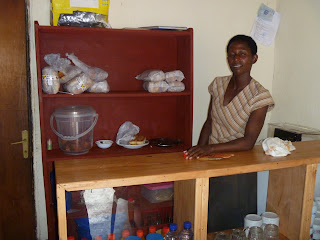


There is one milk place, shown in the bottom two photos on the left, that always sells milk for fifty francs (around 8 cents) less than the other places. The shop keeper recently told me that it was owned by the local health clinic co-op, with 60% of all profits going to the clinic, she being a paid employer who made around 20,000 francs (around $33) a month. This co-op status also, perhaps, explains the presence of a swanky photo-copier, popularly used before each school term to photocopy forms for school. It also boasts sardines and chapatti, something her neighbor can’t afford, and other products, as you can see. Sometimes, I get to much change, a mistake that shop-owners rarely make. The shop keeper studied accounting in secondary school, which seems to be what every shop owner or keeper studies in secondary school.
Across the street, pictured on the top left, is a shop owned by Console, a brave entrepreneur who took out a loan of 500,000 francs, around $830, to pay for initial costs, including the 25,000 franc fee for registering a new businesses and additional costs for new furniture, electricity, 4,000 francs-a-month taxes, and other expenses. The store really does look re-vamped compared to the previous owners, who were running it when I first arrived. The milk? Eh, it’s a bit to fizzy and bubbly. Like I’m drinking half air. The radio’s a nice touch. The previous owners had a television that was always broken, with various boys from the neighborhood always fiddling with it, desperate for it to be fixed, and never succeeding.
I asked her how she took out the loan – was this something people could easily do? Her brother, apparently, co-signed. That helped.
Two other teachers in the area, who told me to call them “Old Jean and Young Jean”, told me about loans they can take out from a special bank through which they receive their salaries as teachers. Their salaries, as primary school teachers, are around 30,000 francs a month ($50), and they can obtain loans at a 14% annual interest rate, with about a quarter of their salaries deducted each month, they say. Old Jean is not much older but seems to be more quiet, wise, and responsible, took out a loan to pay for some land that cost around the equivalent of $100. Young Jean also took out a loan, but just for general expenses. “What else do people use the loans for?” I asked. “Sometimes they take out a loan to invest in a business,” Old Jean said. “Other times,” Young Jean chimed in, “they just take out a loan to drink and relax.” I asked if they use it to pay for university fees. “Yes,” Old Jean responded, “That is a good investment, so sometimes they do that.” With secondary school teachers, who must have a BA, making over four times what primary school teachers make, it would, indeed, seem like a good investment.
I wonder if it’s worth it to take out a loan to start a Milk Shop, the local equivalent of Starbucks, with all almost identical. The shop owner who took out the loan for her shop told me her revenue is 50,000 francs and her profit 20,000 francs, the same as the salary of her risk-averse neighbor.
“Everyone takes credit,” the teachers told me. “Nobody really takes credit” the local who was translating the Milk Shop owner (on the top left) told me, saying she was an exception. I guess 500,000 francs was, perhaps, the exception - it is pretty steep for 20,000 francs profit. And 20,000 francs may be an exaggeration, as I was told by every Social Science professor I ever had that everybody exaggerates their salary. She seems happy and proud of her shop, though she has only been in business for a few months. I will drink to her success. And the success of her six competitors.
No comments:
Post a Comment